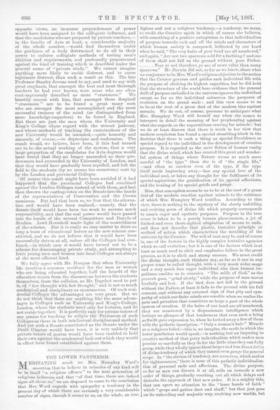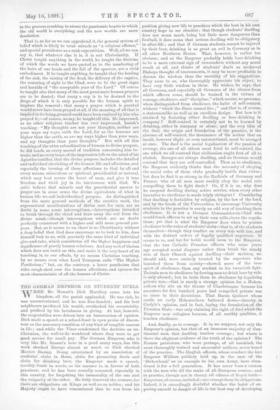THE LOWER PANTHEISM.
MEDITATING much on Mrs. Humphry Ward's assertion that to believe in miracles of any kind will be in itself " a religious offence " to the next generation of religious believers, and that "of that time, there are indeed signs all about us," we are disposed to come to the conclusion that Mrs. Ward regards with sympathy a tendency in the present day of which there are certainly a very considerable number of signs, though it seems to us, on the whole, an irre- ligious and not a religious tendency,—a tendency, we.mean, to credit the Creative spirit in which of course she believes, with something of a positive antagonism to that individualism of purpose towards each and all the minds and characters of which human society is composed, indicated by our Lord when he said, " The very hairs of your head are all numbered," and again, "Are not two sparrows sold for a farthing P and one of them shall not fall on the ground without your Father.
Fear ye not therefore, ye are of more value than many sparrows." Mr. Darwin did not, so far as we know, share what we conjecture to be Mrs. Ward's religious objection to the notion that the Creator governs and guides each individual life with the purpose of eliciting its highest capacities, but he did hold that the structure of the world bore evidence that the general drift of purpose embodied in the universe ignores the individual except so far as the individual subserves the purposes of evolution on the grand scale ; and this view seems to us to be at the root of a great deal of the modern bias against miracle. We do not, of course, presume to anticipate what Mrs. Humphry Ward will herself say when she comes to interpret in detail the meaning of her prophesying against what she regards as the superstitious craving for miracle ; but we do at least discern that there is truth in her view that modern scepticism has found a special stumbling-block in the doctrine that there is such a thing as special Providence or special regard to the individual in the development of creative purpose. It is regarded as the mere fiction of human vanity that the divine mind, which has created this great and wonder- ful system of things where Nature seems so much more careful of "the type" than she is of "the single life," —and often so careless even of the type, if the type itself needs improving away, has any special love of the individual soul, or takes any thought for the fulfilment of its specialaspirations, the gratification of its special affections, and the healing of its special griefs and pangs.
Now, that conception seems to us to be at the root of a great deal of the modern reaction against miracle to the existence of which Mrs. Humphry Ward testifies. According to this view, there is nothing in the mystery of the slowly unfolding and evolving germ of divine life which properly corresponds to man's eager and egotistic purposes. Purpose in the true sense is taken to be a purely human phenomenon, a jet of limited and even short-sighted adaptation of means to ends, and does not describe that plastic, tentative principle or method of action which characterises the moulding of the universe by the Creator. The will of man may be, and of course is, one of the factors in the highly complex tentative agencies which we call evolution ; but it is one of the factors which is at least as much used to elicit and emphasize failure in the great process, as it is to elicit and stamp success. We must credit the divine thought, such thinkers say, so far as it can in any proper sense be called thought, with a very much wider scope and a very much less eager individual aim than human im- patience enables us to conceive. "The mills of God," as the proverb goes, "grind slowly," while the purpose of man moves fretfully and fast. If the bird does not fall to the ground without the Father, at least it falls to the ground with his full consent, and without any external sign of that pity and sym- pathy of which our finite minds are sensible when we realise the pain and privation that constitute so large a part of the whole system of creation. If the hairs of our head are all numbered, they are numbered by a dispassionate intelligence which betrays no glimpse of that tenderness that even such a being as Swift gave expression to, when he locked away a few of them with the pathetic inscription : " Only a woman's hair." Miracle as a religious belief,—this is, we imagine, the mode in which the lower pantheism would speak,—is nothing but an imputing to creative method of that petty individualism which makes men Provide so carefully as they do for the little aims they can fully grasp, while they wholly ignore those larger and less direct drifts of divine tendency of which they cannot even gauge the general scope. In " the stream of tendency, not ourselves, which makes for righteousness," there is none of this pathetic individualisa- tion of personal ends and affections. The divine purpose, so far as men can discern it at all, rolls on towards a new order of things, gradually crushing out all which delays and disturbs the approach of that new order. It is a mighty tide, that can spare no attention to the "lame bands of faith" which "grope and gather dust and chaff," but that just goes on its unheeding and majestic way, evolving new worlds, but
in the process crushing to atoms the passionate hearts to which the old world is everything and the new worlds are mere desolation.
That is, as far as we can apprehend it, the general system of belief which is likely to treat miracle as "a religious offence," and special providence as a rank superstition. Well, all we can say is, that whatever else it is, it is not Christianity. If Christ taught anything in the world, he taught the doctrine of which the words we have quoted as to the numbering of the hairs of our heads and the fall of the sparrow, are a vivid embodiment. If he taught anything, he taught that the healing of the sick, the raising of the dead, the delivery of the captive, the restoring of sight to the blind, were to be the great signs and heralds of "the acceptable year of the Lord." Of course he taught also that many of the most passionate human prayers are to be denied ; that many a cup is to be drained to the dregs of which it is only possible for the human spirit to implore the removal ; that many a prayer which is granted would never have been prayed at all, if the meaning of all that is implied in its being granted could have been realised by him who prayed it ;—of course, we say, he taught all this. He impressed, as no other religious teacher has ever impressed, Isaiah's teaching: "My thoughts are not your thoughts, neither are your ways my ways, saith the Lord, for as the heavens are higher than the earth, so are my ways higher than your ways, and my thoughts than your thoughts." But with all this teaching of the 'utter subordination of human to divine purpose, he did teach, as every morsel of tradition concerning him be- trays, and as every trace of the impression left on the mind of his Apostles testifies, that the divine purpose includes the detailed and individual cherishing of the human life and affections, and especially the turning of these affections to God by all and every means, miraculous or spiritual, providential or natural, which may best secure the heart of man, and give it true freedom and vivid joy in its intercourse with God. We quite believe that miracle and the providential answer to prayer are in some sense the divine equivalents of what in human life we call individualised purpose. As distinguished from the more general methods of the creative work, the supernatural manifestations of divine care for men, are no doubt in some sense interruptions,—interruptions intended to break through the cloud and draw away the veil from the divine mind,—though interruptions which are no doubt perfectly consistent with a higher and still more general pur- pose. But, as it seems to us, there is no Christianity without a deep belief that God does encourage us to look to him, does himself look to us, with precisely the same kind of individual give-and-take, which constitutes all the higher happiness and significance of purely human relations. And any sort of theism which does not insist on this, and make it the very heart of its teaching, is, to our minds, by no means Christian teaching, by no means even what Lord Tennyson calls "The Higher Pantheism ;" but, on the contrary, a lower pantheism that rides rough-shod over the human affections, and ignores the most characteristic of all the lessons of Christ.



































 Previous page
Previous page